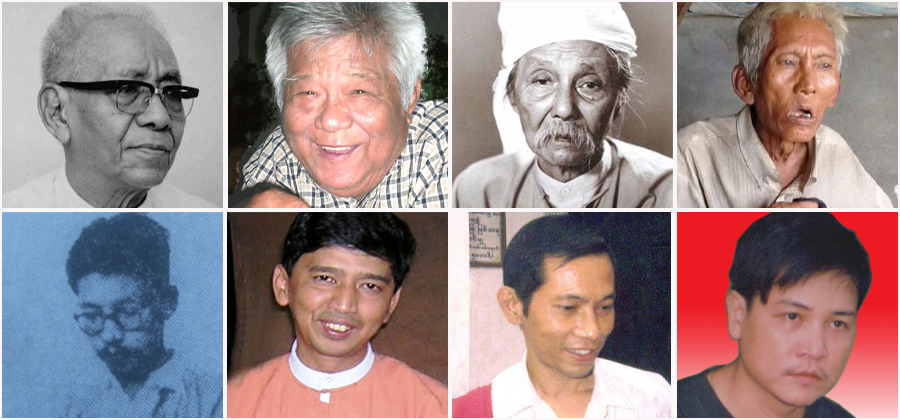Poet Khet Thi was arrested by some 100 junta troops on the evening of May 8. The following day, he was dead. His wife reportedly had to ask the authorities for permission to collect his body, whose internal organs had been removed for autopsy, from Monywa Hospital.
The 45-year-old poet was arrested for alleged possession of explosives, but no evidence was found at his home. He was the third poet to be killed by junta forces in Sagaing Region’s Monywa in just two months. Poets K Za Win, 39, and Kyi Lin Aye, 36, were shot dead in crackdowns in March.
Poet U Yee Mon, the poet-turned-defense-minister in the National Unity Government (NUG) formed to rival the military regime, wrote on his Facebook page: “Khet Thi and K Za Win, two Monywa poets have fallen. I am sad. I am committed to fight until we win.”
More than a dozen poets who have shown solidarity with the people against the military regime have also been detained in Yangon, Ayeyawady’s Pathein and Taninthayi’s Myeik.
In Myanmar’s long history of revolution, poets have fought injustice with the power of art.
After Myanmar’s last monarch King Thibaw was dethroned and sent into exile, renowned poets from the royal capital Mandalay, including Saya Pe, Sebunni Sayadaw, U Kyawt and Maunghtaung U Kyaw Hla, wrote poems intended to promote nationalism and patriotism. Saya Pe was not content fighting with the pen and went to Shan State to take up the sword. He died there. Maunghtaung U Kyaw Hla was also the first poet to be arrested under colonial rule for his anti-colonialist poems.
The most famous poet laureate in the colonial period was Thakhin Kodaw Hmaing, also known as Maung Lun, who said he would fight with poems for the independence of the country.
His pen proved to be mighty in instilling nationalism and patriotism in Myanmar’s people.
In 1941, his reputation as an anti-colonial nationalist and patron of Doh Bamar Asiayon (the We Burmans Association) earned him a place on the British authorities’ “Burma List,” making him an “enemy of the state.” The association played an important part in Myanmar’s independence struggle, bringing together nationalist elements and fresh political ideals while raising political consciousness.
In the time of the Anti-Fascist People’s Freedom League government after independence, poets Daung Nwe Swe, Ne Thway Ni, Maung Yin Mon and others were known for their works supporting the movements of students, workers and farmers as well as anti-war poems and satirical works critical of bureaucrats.

Bottom row (left to right) Daung New Swe, Min Ko Naing, Min Lu, Shwe Phone Lu
However, draconian censorship was imposed after General Ne Win seized power in 1962. Poet Min Yu Wai was sacked as the chief editor of military-run Myawady Magazine after he wrote a poem deemed to be critical of the dictator.
Poet Win Latt and editor Win Khet of ‘Perspective’ Journal were sentenced to two years in prison for publishing a satirical poem about Ne Win and his wife Khin May Than.
Many poets were put behind bars under the rule of Burma Socialist Program Party (BSPP) as they took part in every movement against the repressive regime.
In 1970s, poet Lay Maung from Mandalay, who was serving his time as a political prisoner in Coco Islands, staged a hunger strike together with other prisoners. They called for abolishing the island prison, which was dubbed as a Burmese “Devil’s Island.” He died in prison after staging a hunger strike for more than 50 days. Thanks to the sacrifices of the poet and seven others, BSPP transferred all the prisoners to Yangon’s Insein Prison, marking a significant event in the history of Myanmar’s correctional system.
Poets were united with the people in the pro-democracy uprising in 1988 that toppled the single-party dictatorship of Ne Win. U Min Ko Naing, one of the prominent student leaders in 1988, is also a poet.
Student leader Shwe Phone Lu, who would later become a best-selling author-cum-poet under the pen name Taryar Min Wai, wrote a poem asking the students to boycott education as the military regime re-opened universities and schools after the uprising. He was jailed for five years for that poem.
Famous writer-cum-poet Min Lu was also arrested in 1989 for his satirical poem “What has happened?” criticizing coup leader General Saw Maung and Myanmar’s military. Both he and the publisher were given five years in prison as the poem became a phenomenon.
Poet Min Thu Wun, father of the 9th president of Myanmar and the first president of the National League for Democracy (NLD) government, U Htin Kyaw, had also had his poems banned by the military regime after the NLD won the 1990 general elections because he took an active part in the party’s campaigns.
Poet Tin Moe, a prominent figure of the NLD, was also jailed for five years because he wrote poems and gave talks across the country for the cause of democracy. He was forced into exile after his release and died abroad in 2007.
In 2008, poet Saw Wai was arrested for his Valentine’s Day poem with a coded message, ridiculing the then-dictator Senior General Than Shwe. The first words of each line of the poem read, “power-crazed Snr-Gen Than Shwe.”
Over past 136 years since King Thibaw was dethroned in 1885 to military chief Senior General Min Aung Hlaing’s seizure of power on Feb. 1, 2021, poets have shown solidarity with the ordinary people and have been at the frontline in every revolution in Myanmar. Khet Thi’s following poem is a testimony to that.
“In heads, they shoot
Never do they know
Revolution lies in hearts.”











